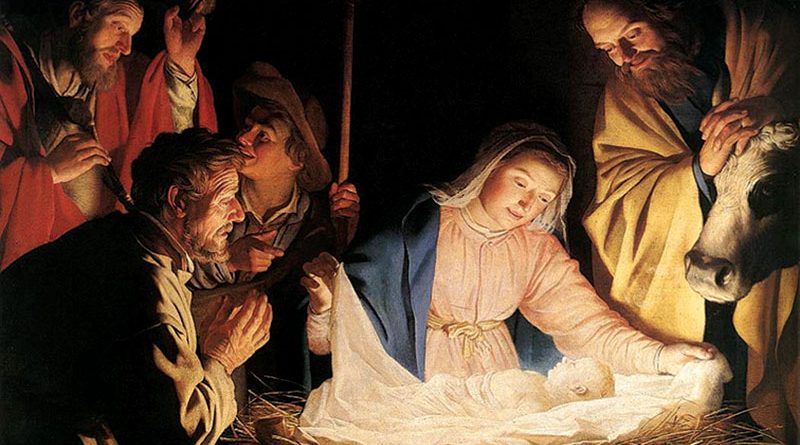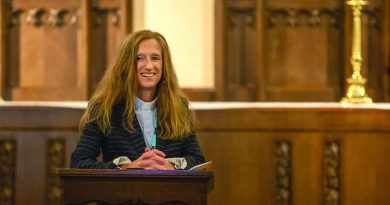The End of Advent
Adoration of the Shepherds (1622) by Dutch painter Gerard van Honthorst. “O Come All Ye Faithful” invites us to see the babe as the Creed does: no less than God of God, Light of Light, yet wrapped in swaddling clothes.
O Come, All Ye Faithful
J.F. Wade’s Cantus Diversi 1751
Translated from the Latin by F. Oakley ,
W.T. Brooke, & others
ADESTE FIDELES
By Tim Perry
I CAN THINK OF no better way to conclude one’s Advent preparations than to start singing “O Come All Ye Faithful,” in as robust a voice as possible. It is, after all, the carol that most clearly announces Advent’s end and goal. We have, with the patriarchs and prophets, the Blessed Virgin and St. John the Baptist, been hoping to see him who is the redemption of Israel and now he has come. Our invitation, “O Come, Immanuel,” has been answered and a new invitation extended. Jesus having arrived, now extends to all the faithful the call to come to behold him: the King of angels, Christ the Lord.
No maudlin sentimentality follows. No silent, sleeping little Lord Jesus fills our gaze; neither does a pah-rum-pum-pumming drummer boy meet our ears. Rather, the words of the Creed identify the babe: no less than God of God, Light of Light, lies wrapped in swaddling clothes: Very God, Begotten, not created squalls and cries and is nursed by his mother. Imagine! The very God, through whom creation came into being and in whom all creation hangs together, is no longer remote from what is his. He abhors not the Virgin’s womb. He comes to us as one of us. He comes to us as one of us because He comes from her.
He shares fully in our humanity precisely because he has fully embraced the humanity of his mother. Toward the end of C.S. Lewis’ The Last Battle, Queen Lucy remarks “In our world, too, a stable once had something inside it that was bigger than our whole world.” Indeed. And a somewhere smaller than a stable – a womb. The Blessed Virgin contained the Uncontainable God that he might take up, and thereby heal, all that had fallen into sin; that he might be known and loved by his wayward creation. As one of us, he calls to us to come and adore.
The call to adore extends to the furthest reaches of creation, beginning first of all with the realm of immaterial intelligences, with the angels. In a hymn extoling the love of Christ poured out on the Cross, Charles Wesley wondered “Who can explore the strange design? In vain the first-born seraph tries to plumb the depths of love divine.” But no less a mystery confronts us here. The Incarnation confounds and enrages Lewis’ Screwtape when, in his last letter, he writes: “This animal, this thing begotten in a bed, could look on Him . . . [for he] wears the form of a man.” But make no mistake: the archangels Gabriel and Michael are just as uncomprehending; the mystery that elicits howls of damnation and despair from the Evil One’s minions calls forth naught but praise and thanksgiving from the armies of heaven. And so they, too, are invited to join with us in adoration.
The call to come goes next, through the exultant angels, to shepherds. Not to Caesar or Pilate. Not to Herod. Not to the priestly caste who managed the Temple coffers or the Pharisees who ever sought to apply the Law to daily life. The call came to shepherds, to the socially lowly, to the caste that gave Israel her greatest king. A new David had arisen like the old: from the most unexpected place. A new David who would surpass his father in every way. For he is the one whom David himself names as Lord in Psalm 110.
And finally the invitation is offered to the Magi – kings of the east (Ps. 72:10) who were looking for Him who was born King of the Jews. These are not excluded. The promise to Abraham that all the world would be blessed in his Descendent has come true. In Him and through Him, the Gentiles would now be gathered together with Israel into the One People of God destined for One Future in which there would be no need of Temple (the sign of God’s reign in space) or Sabbath (the sign of God’s reign in time) for God would be all and in all (1 Cor. 15:28).
How, having reached the end, can we not join with them in our praise? And so we are given words to echo the praises of angels and shepherds and Wise Men: “Yea Lord, we greet Thee, born this happy morning. Jesus, to Thee be all glory given.” Our Advent wait is over; the Word of the Father has appeared in flesh and calls us all to come and adore him who is Christ the Lord. TAP
Dr. Tim Perry is the theological editor of The Anglican Planet and is an adjunct faculty member at Saint Paul University in Ottawa and Trinity School for Ministry in Ambridge, Penn. He lives in Shawville, Quebec.




